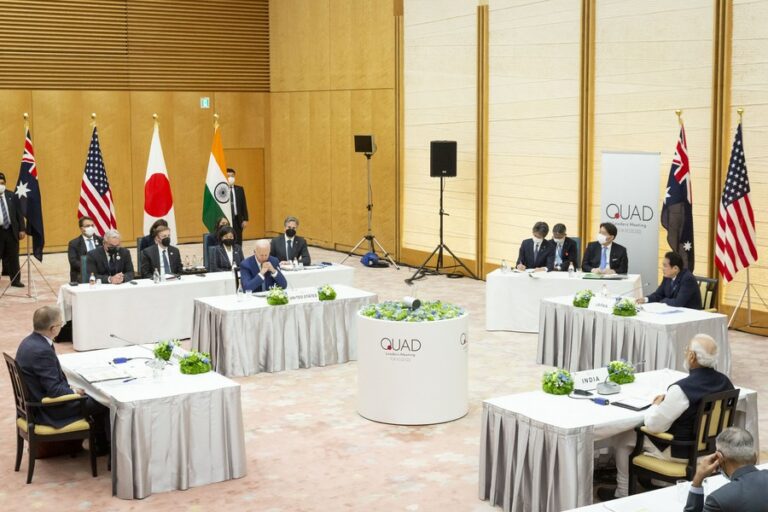
By Zhong Sheng, People’s Daily
A joint statement released after the U.S.-Japan summit on May 23 made negative comments on a series of China-related issues. It grossly interferes in China’s domestic affairs and maliciously attacks China’s foreign policy.
Such practice of the U.S. and Japan to smear China clearly exposes their sinister intention to contain China and separate the region.
As a regional country, Japan should have played a constructive role in maintaining regional peace, stability and prosperity. However, it is cooperating with the U.S. to formulate the so-called “Indo-Pacific Strategy (IPS)” which is expected to stir up separation and confrontation.
It is a move that invites disaster by letting in invaders, which will seriously threaten regional peace and stability and hurt Japan’s own interests.
China’s position on issues relating to Taiwan, the Diaoyu Islands, and the South China Sea is consistent and clear. The country has a firm resolution and will to safeguard its sovereignty, security, and development interests. Any country or force that plans to contain China’s development with any means will be met with firm and strong reactions from the Chinese side.
The Taiwan question concerns the political foundation of China-Japan ties and the basic credibility between the two countries. It is a major matter of principle.
Japan had colonized Taiwan for half a century and committed innumerable crimes, over which it bears grave historical responsibilities to the Chinese people. Stirring up troubles on the Taiwan question, Japan will only put itself on the opposite side of the 1.4 billion Chinese people.
No matter what Japan says or does about the issues related to the Diaoyu Islands and the South China Sea, in collusion with the U.S., an extraterritorial country, it will never change the fact that the Diaoyu Islands and its adjacent islets belong to China, nor will it hurt China’s territorial sovereignty or maritime interests on the South China Sea.
Seeking troubles on these issues will only present clearer Japan’s intentions to escalate regional tensions and beef up its military capabilities.
The alliance between Japan and the U.S. shall not be an excuse for Japan to hurt the interests of China. For some time, Japan has worked closely with the U.S. to separate the region, fanning up ideological confrontation and indulging bloc confrontation in the area of security. It has gradually become a troublemaker for regional peace and stability.
Facts have proved that the true intention of Japan and the U.S. is to form a clique for geopolitical competition, build an Asia-Pacific version of NATO, and wage a new Cold War in the region, though the two countries are always talking about so-called freedom and openness.
Some international analysts pointed out that in the new round of U.S.-Japan interaction, the Asian trip of the U.S. leader had a major but hidden target – containing China’s regional influence, and Japan is more and more like a flag-bearer for the U.S. to promote the latter’s strategy in the Asia-Pacific region. Such dangerous and irresponsible practice of Japan is obvious to the international society.
In history, Japan had long been dreaming of “abandoning Asia and aligning itself with the West.” It had launched militarism wars to invade its neighboring countries and caused catastrophic disasters for the people in regional countries.
Japan should reflect on its history of invasion and learn from history to avoid making new damage to the region. It should follow a path of peaceful development and be cautious in the area of military and security to avoid repeating the mistakes of history.
Today, Japan, in a hurry to gain a position on the hegemonic chessboard of the U.S., is attempting to challenge the post-war world order, justify its military expansion and shake off from post-war bondage. Regional countries must stay alert to such shameful practices of Japan to seek private gains at the sacrifice of regional interests.
As the world is going through profound changes unseen in a century, especially in a time of the global pandemic, the international society needs solidarity and cooperation more than anything else, and the Asia-Pacific region is looking forward to peace and stability.
The Ukraine crisis once again reminded regional countries of the importance of peace and stability. Bloc confrontation will only create endless troubles. To prevent the rising of Cold War mentality in the Asia-Pacific region and stop another similar crisis in the region is a common aspiration of most of the Asia-Pacific countries.
Japan, acting as a strategy vassal of the U.S., is fanning up bloc confrontation and pursuing its own security at the sacrifice of other countries’ security. It is trying to bring back the outdated Cold War script in the Asia-Pacific region, which is totally against the trend of the times.
It’s a dangerous move for Japan to pull America’s chestnuts out of the fire, and beggar-thy-neighbor approaches will only be a wrong path that leads to failure.
Japan should learn a lesson from history, eye on regional peace and stability, act cautiously, and gain trust from other regional countries with concrete actions.
China-Japan relations are at a critical crossroads as the two countries are about to mark the 50th anniversary of the normalization of their diplomatic ties. Only by adopting a proper attitude, correcting its strategies, and making concrete actions to build stable relations with China, can Japan avoid further damaging its relations with China and be responsible for the security of regional countries and the Japanese people.
(Zhong Sheng is a pen name often used by People’s Daily to express its views on foreign policy and international affairs.)










